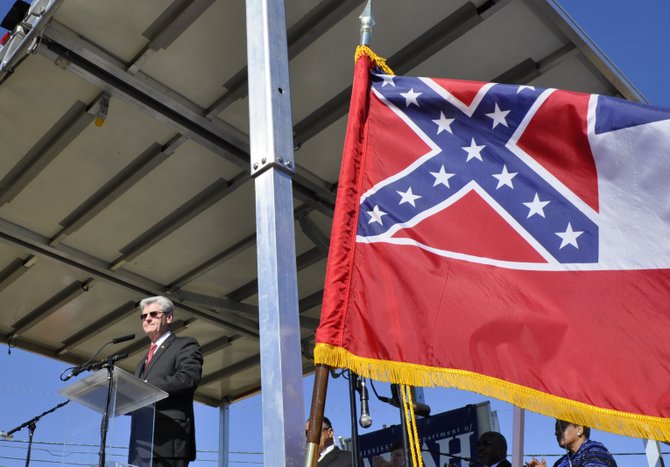Gov. Phil Bryant spoke at the groundbreaking of Mississippi's new Civil Rights Museum next to the state flag containing the Confederate battle symbol. Myrlie Evers-Williams, the widow of slain Jackson civil-rights hero Medgar Evers, is visible below the flow. Photo by Trip Burns
Ah, the flag. The Mississippi State flag is like that obnoxious relative at a family gathering. He's offensive, disrespectful and not representative of your family's values at all—one hopes—but he's not going anywhere anytime soon. So you put up with him.
Last week, JFP photographer Trip Burns drew national attention when he shared a brilliant piece of photojournalism with the world. When Tyler Cleveland's story about the ground-breaking of Mississippi's new museums, including a civil rights museum, went up at jfp.ms/museums, so did Trip's photo showing the jarring symbol of the Confederacy flying in the foreground with Gov. Phil Bryant at the mic and Myrlie Evers-Williams, former Mississippi Supreme Court Justice Reuben Anderson and state Sen. John Horhn sitting behind the flag.
The latter three are, of course, African American, and Evers-Williams saw her husband Medgar gunned down five miles northwest of the new museums in 1963. The Confederate battle emblem that still appears in our state flag was the hateful symbol preferred by the man who executed Medgar as well as that of his buddies in the Citizens Council and the Ku Klux Klan.
It was, and still is, a symbol of resistance against integration and equality for blacks in our state and nation.
No, wait! ... some will yell. It's a symbol of heritage, and of respect for southerners who died in a war fought not over slavery, but for economics and state's rights.
Right. This state's and other Confederate states' right to own and use human beings in order to increase their wealth—the economics of slavery was exactly what the Civil War was about.
It's remarkable to me how many people have been told something different—and choose to believe it. But I'll be honest: Even though I never had any doubt about what the Civil War was fought over—at least as an adult—it wasn't until a decade ago that I first read the evidence no one can deny. After some or another debate on the JFP website with a slavery apologist, my nephew-in-law emailed and asked me if I had read Mississippi's Declaration of Secession. I hadn't. And I sure as hell hadn't studied it back in history class at Neshoba Central where I should have learned it, just as every student in the state (or nation) should before getting a diploma.
Mississippi's Declaration of Secession pulls no punches:
"Our position is thoroughly identified with the institution of slavery—the greatest material interest of the world. Its labor supplies the product, which constitutes by far the largest and most important portions of commerce of the earth. These products are peculiar to the climate verging on the tropical regions, and by an imperious law of nature, none but the black race can bear exposure to the tropical sun.
"These products have become necessities of the world, and a blow at slavery is a blow at commerce and civilization. That blow has been long aimed at the institution, and was at the point of reaching its consummation. There was no choice left us but submission to the mandates of abolition, or a dissolution of the Union, whose principles had been subverted to work out our ruin."
And Texas' secession explanation is even more blatant, along with all the others of Confederate states. If you want to see a slavery apologist go radio silent on Facebook, just drop the link and the opening section into a comment. The silence is deafening.
What some folks also don't seem to realize is that the Confederate cross, enshrined in our taxpayer-funded state flag, was the symbol of defiance for those who believed that "a blow at slavery is a blow at commerce and civilization." First, in the war and then afterward, whether waved by the first round of the Ku Klux Klan, created to scare blacks out of claiming their new rights, and then for decades by whites trying to intimidate blacks out of voting, integrating schools and daring to walk proudly through the front door.
Put another way, today's taxpayers pay to embed that heinous symbol in a state flag that flies outside office buildings, museum ground-breakings and public schools that, too often, have almost totally re-segregated.
What's interesting is to watch reactions among many white people when you try to discuss why the flag needs to be inside the museum, not waving outside on behalf of us all. "It's just a piece of cloth." Right, so why do we all have to pay for it? And is the American flag "just a piece of cloth"? Of course not. Flags matter. We all know that.
"It's tradition." Yes, the worst kind, and it hurts us all, some much more than others.
"I don't mind it." Well, go ask yourself why you don't mind it. And don't you care about how black people feel in the state with the highest proportion of African Americans. They don't get a voice?
"Voters overwhelmingly voted to keep it there." So? Rights have always been about that of the individual, not the majority, by necessity. And what might have happened if more people were educated about the flag's true origins, not to mention what the dang secession declaration proves about slavery?
What if we challenged the revisionism in an honest, deliberate, direct fashion?
Here's the rub for me personally, not to mention for many others of all ethnicities. I'm not black, and I'm still offended to the core by that flag every time I see it. It's used by politicians to play coded race politics (textbook "southern strategy") to get racist votes (ironically, for policies that don't benefit many of the presumed racists).
It's despicable to watch politicians—including Haley Barbour and Phil Bryant, who spoke at the ground-breaking—try to appeal to people they assume are racist. Why not help lead them another direction? Perhaps by leading on changing the flag?
Still worse, this state flag tells the world (and each other) that white Mississippians have not changed. We can protest all we want about what others think about our state—but we all bear the burden of those assumptions of the worst about us.
And why wouldn't they believe it when so many of us brag that we "overwhelmingly" kept that flag in place to represent us? Is this age-old game of defiance really worth painting ourselves as unchanged racists more than a century after we lost the war to keep slavery? Just who is living in the past here?
Ten years ago, I went to the old Capitol and listened as Evers-Williams gave her husband's papers to the state of Mississippi. I was inspired by her belief that Mississippi can and will change and leave the old ways behind us (or in a museum). I wrote then that Mississippians had to get on with fighting the "worthy scrap" of change until "that ugly symbol rots off the flagpole out of sheer irrelevance." (See jfp.ms/scrap)
I have seen that fight unfold, and it feels good. Our past is not past, yet, though, and it won't be as long as we as a state allow that flag to continue tainting and obscuring our progress. It is high time to take action and prove to the world, and ourselves, that Mississippi is a more civilized place these days.
More stories by this author
- EDITOR'S NOTE: 19 Years of Love, Hope, Miss S, Dr. S and Never, Ever Giving Up
- EDITOR'S NOTE: Systemic Racism Created Jackson’s Violence; More Policing Cannot Stop It
- Rest in Peace, Ronni Mott: Your Journalism Saved Lives. This I Know.
- EDITOR'S NOTE: Rest Well, Gov. Winter. We Will Keep Your Fire Burning.
- EDITOR'S NOTE: Truth and Journalism on the Front Lines of COVID-19



